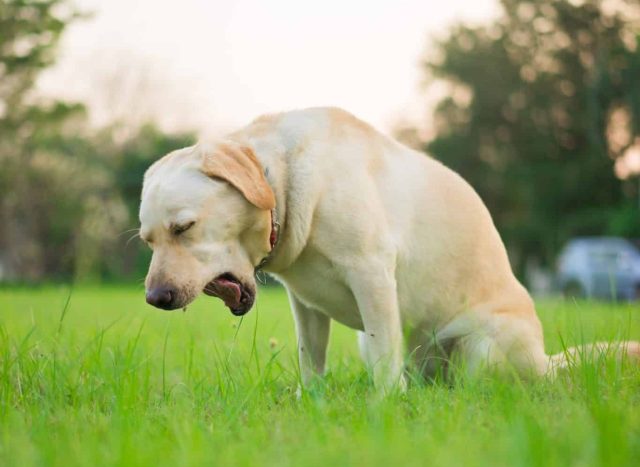Dogs cough for a variety of reasons. Just like people, they can cough to clear their airways of debris or mucous, but a persistent cough should be checked out by a vet. All dogs cough sometimes, but only a veterinarian can help you rule out some of these causes, pinpoint why your particular dog is coughing, and give you a plan for treatment. Whenever I see a coughing patient, I think through these possibilities and then apply what I know about the particular dog to help me decide what tests might be appropriate to find what the trouble is.
The Following are Some of the Reasons for Persistent Coughing in Dogs:
1. Heart or Lung Disease
Scarring in the lung tissue, either from aging or exposure to an agent that caused or contributed to scar formation or cardiac disease (like congestive heart failure), will certainly cause a cough. Diagnostic testing may include a thorough exam and probably radiographs (x-rays).
Any underlying disease must be identified and treated. Sometimes, the only treatment involves managing the symptoms with cough suppressants or steroids but trying to manage symptoms without making sure there is no underlying disease could be dangerous.
These processes are less likely in puppies or young dogs. If you have a middle-aged to older dog with a chronic cough, degenerative disorders of the heart or lungs may be the cause.

2. Birth Defects or Structural Abnormalities
When anatomical structures do not develop normally as a result of congenital defects at birth, like cardiac malformations or structural deformities in the thoracic cavity, this can lead to a cough.
Other examples of this type of abnormality are breed-associated, like tracheal collapse (an abnormality frequently noted in small breed dogs where the tracheal narrows and partially blocks the airway) and Brachycephalic airway syndrome (a multifaceted airway issue in smashed-face breeds like English bulldogs and Pugs). These may not be noticed until later in life when they start to cause coughing.
Because there is such a wide range of causes, it is important to see a vet to ensure that corrective surgery is not needed. Birth defects can often be completely repaired surgically if found early, so do not delay. A pet that has never coughed in her life and is now a coughing senior is less likely to suffer from an anomalous defect, but some anomalies can worsen with age and then become both anomalous and degenerative issues.
3. Cancer
Cancer of the lung will cause chronic coughing. The lungs get a lot of blood supply because their job is to oxygenate all of the blood, so any type of cancer that sheds cells into the blood can spread to the lungs. Coughing is not the only sign of cancer, but if your dog does have a chronic cough and is an older dog, cancer must be on the list of possible causes, and a vet must be consulted to be sure that your pet is comfortable and you know what to expect. Advances in treatment for pets with cancer have changed the prognosis for some types of cancers, so getting an accurate diagnosis is worth your time.
4. Infectious Diseases
Infections can and do often cause a cough. Bacteria, viruses, and fungal infections are all on the list for a coughing dog. Kennel Cough is caused by a bacterium that can easily be spread between dogs.
Think about possible exposures for your dog. If there is a history of your dog spending time with other dogs, like boarding, grooming, or playing at a dog park, he could have been exposed to bacteria and viruses. Fungal infections are not as common as the other infectious causes in many parts of the country but should be on the list, especially if your dog has a fever, spends a lot of time outdoors, or likes to dig in the soil.

5. Inflammatory Disease
Inflammation is a process that is characterized by the body’s production of chemicals in response to a trigger. Sometimes the trigger is an infection, but sometimes, the inflammatory process is prompted by other causes, like allergy or auto-immune disease.
Things like asthma and allergic bronchitis can cause inflammatory coughing. Treatment aims to stop the formation of the chemicals and slow their damaging effects. Any age of dog can experience inflammatory coughing, and some of the causes can be life-threatening, so getting an exam and diagnosis is imperative. Depending on the underlying issue, inflammation can be a short-term and curable process or a more long-term and incurable (but manageable) process.
6. Parasites
Many people do not realize that parasites can cause coughing. Not only are there lungworms that live in the lung tissues, but heartworms are known to invade the heart and lungs. Even the intestinal parasites can have a part of their life cycle that causes them to migrate through the lungs. Most parasite issues can be easily prevented with regular parasite prevention programs.
The best dewormers and all heartworm preventives are available only by prescription, so you will need to see a vet to manage this possibility. However, the benefits of having your dog protected by these products go far beyond coughing.

7. Traumatic Injury
Many times dogs that suffer trauma to the chest will cough. I often see coughing during the healing phases following hit-by-car cases. It does not take a severe and obvious blow to bruise the lungs and cause a cough. If your dog is allowed to run loose or has been missing, you might not even know that he had a traumatic injury. Your vet can help you find out. Treatment can be aimed at pain relief and stabilization while the bruising resolves, and your vet can make sure no other injuries have occurred from the trauma.
Knowledge is power when your pet is sick. The more you can find out about why your dog is coughing, the better equipped you are to manage it. Coughing is not going to be something you can manage on your own since the causes can be varied, but a veterinarian can help you narrow the list and start on the right path to treatment.
8. Allergies
Allergies in dogs can lead to coughing when the immune system reacts to airborne irritants like pollen, dust mites, mold, or even certain household chemicals. These allergens can cause inflammation in the airways, leading to symptoms similar to those of asthma or bronchitis. As the respiratory passages become irritated, dogs may develop a dry, hacking cough, especially during high pollen seasons or after exposure to specific triggers. In some cases, postnasal drip from allergic rhinitis can also tickle the throat and prompt coughing. Managing a dog’s environment and consulting with a veterinarian for proper diagnosis and treatment—such as antihistamines or allergy testing—can help reduce coughing and improve their overall comfort.
When to Worry About Your Dog’s Cough
Coughing in dogs can stem from a variety of causes—some minor and others more serious—so it’s important not to ignore this symptom. Whether it’s due to allergies, infections, heart disease, or even something as simple as throat irritation, identifying the root cause is key to helping your dog feel better. If your pup’s cough is persistent, worsening, or accompanied by other symptoms like lethargy, difficulty breathing, or loss of appetite, it’s time to see your veterinarian. Early diagnosis can make all the difference when it comes to effective treatment and peace of mind. Remember, a healthy, happy dog starts with attentive care and timely medical support.


